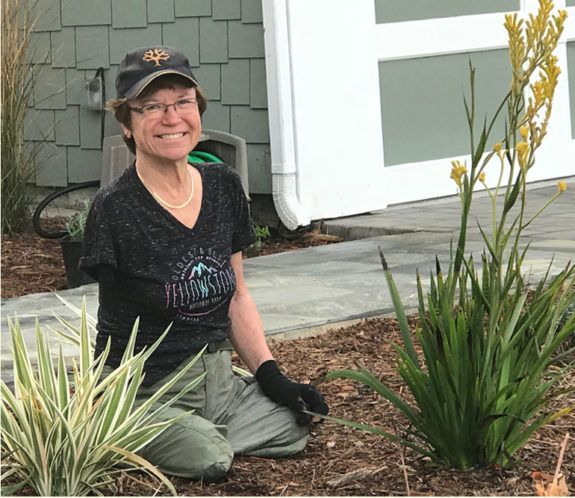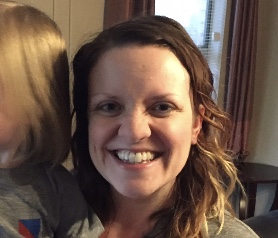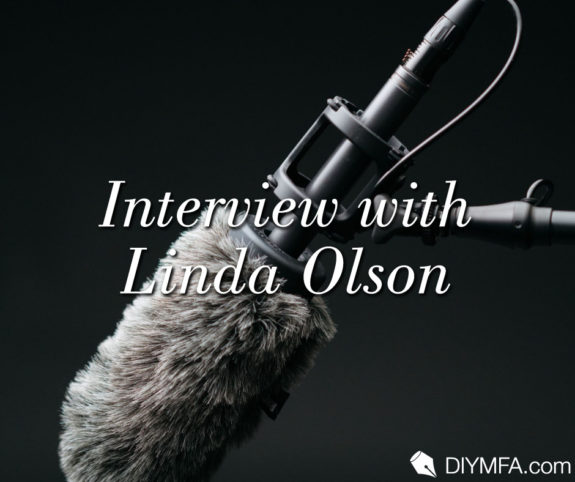This week our #ownvoices series shifts slightly from the experiences of BIPOC mystery/thriller writers to share the story of a woman who endured an extraordinary event and became part of a large and varied group – people with disabilities both seen and unseen. Linda Olson was a young med student and wife in 1979 when, during a vacation in Germany, a terrible accident left her a triple amputee. Despite tremendous challenges in relearning even basic functions, she went on to a successful career as a radiologist and became a mother of two. Linda shares her story in her new memoir Gone. In this interview, she talks about societal attitudes toward amputees and others with physical disabilities, as well as the inspiration for sharing her story.
About Linda Olson

Linda K. Olson, MD, FACR, is the author of GONE: A Memoir of Love, Body, and Taking Back My Life (She Writes Press) and motivational speaker with a Get Out and Go message. At age twenty-nine, Olson was vacationing with her husband in Germany when their van was hit by a train, shattering their lives as well as her body. “I didn’t marry your arms or your legs. If you can do it, I can do it,” was the first thing her husband said to her in the hospital after she woke up as a triple amputee. What at first appeared to be a tragedy became a love story and a life extra-ordinarily well-lived: giving birth to two children, pursuing highly respected and rewarding careers, along with adventuresome outdoor travel across the globe in canoes, kayaks, and backpacks. She shows us how acceptance, adaptation and innovation can empower us to work through life’s adversities. A Professor Emeritus of Radiology at University of California, San Diego and former director of Breast Imaging in the Department of Radiology, she is committed to empowering Parkinson’s patients and families to live life as fully as possible in spite of their disabilities. A graduate of Loma Linda University School of Medicine (’76), she has been a triple amputee since 1979 and was diagnosed with Parkinson’s disease in 2015. Olson and her husband, David Hodgens, MD, raised two children and now live in San Diego with their black lab, Sally.
The Interview
Sara Farmer: I liked the funny chapter titles in Gone. They exemplified the determined positivity you brought to your disability. How did you decide the balance in the book between portraying your positivity and the trying times?
Linda Olson: Funny you should ask that, because the most common criticism from my writing group was my unrelenting, positive, happy-go-lucky attitude and the lack of showing my struggles, down-times, and discouragement. I definitely had down times, but they were very short-lived.
I’ve always been an upbeat person. I want people to laugh and be happy. I discovered early on that I was the only person that could make that happen. I also wanted my husband to stick around and I figured that if I was happy, he’d be happy, too. I know how Pollyannaish that sounds, but it’s true.
So, I think the answer to your question is I had to work hard to find the trying and painful times, because I didn’t have lots of them.
Sara: Did you struggle with revealing what really happened to the van the day of the accident?
Linda: Yes. It wasn’t until I was close to the end of writing the book that I realized it was one of the most important parts of our story. Our version of telling the story definitely gave us control over our lives.
For thirty-five years, very few people knew what really happened. The first time I spoke about it was to one of my writing groups. They were speechless. Their first question was, had we ever talked about this as a family. And then they thought I should seek counseling about it.
My response was that it had been a protective tool and that now was the time to reveal it because it had worked. Our children were in their thirties when we told them what truly happened. By then they’d had a wonderful, loving relationship with both sets of grandparents and we had intact, happy families. There was no anger and no recrimination. What was done was done.
Sara: Do you think the determination it took to become a doctor as a female during that time period contributed to your ability to face and conquer the limitations of your disability?
Linda: Slightly less than 10% of students were female when I started medical school. I think much of the heavy lifting had been done by women ahead of me. I did not feel undue pressure because I was a female.
Having said that, getting through medical school was, and still is, a grind. So yes, I think the discipline and determination of my medical training was very beneficial in helping me put the blinders on, put my head down, and work as hard as I could. Most physicians are also very good in dealing with delayed gratification and I suspect that helped, also.
Sara: The story about the parent at your daughter’s school that thought your daughter Tiffany was lying about your limb differences floored me. You have worked so hard for inclusion in normal activities and to continue as much of your previous activities as possible. And to have people see you. Was that part of your motivation for this book? To get that message to a bigger group of people? If not, what made you want to tell this story now?
Linda: I’ve always loved the story of the mother who thought Tiffany was lying about me not having legs and an arm. I guess it was because I knew that she had actually seen me many times and was clueless about my disability. On the other hand, I couldn’t understand her feelings. Did she think being a triple amputee was incompatible with life?
People kept telling me that I should write a book. I ignored them for thirty years, because I was busy being a mom and a wife and having a career as a radiologist. I enjoyed that immensely and did not feel like I needed any more notoriety than what we already had.
I think there were two things that changed my mind. First of all, our children were grown and I could look back and see that our lives had been successful and happy. It seemed that we now had the evidence to show others who might be struggling with physical disabilities that by working together they could have a family and a rewarding life.
The second more recent event happened after I was diagnosed with Parkinson’s disease. I spoke at an international meeting and was overwhelmed afterwards by the response of the people with Parkinson’s and their caregivers. I’d shown slides of my husband hiking with me in a pack on his back. They saw us rafting down Class 5 rapids through the Grand Canyon. They laughed at my video of butt-walk racing on the floor with my personal fitness trainer. Hearing our story and seeing slides of me as an obviously disabled person who was able to “Get Out and Go” gave them the inspiration they needed to do the same thing. They said that if I could do it, they could do it.
Sara: Why did you choose to include sections from your husband’s, son’s, and daughter’s viewpoints? The book opens with your daughter Tiffany’s viewpoint and ends with your son Brian’s. Why lead with and end with their voices instead of yours? I know you mentioned in the “Acknowledgments” that you found both essays to be beautiful and compelling and they definitely are. Were any other narrative purposes served by framing your story with your children’s perspectives on it?
Linda: Early on, I discovered that after I’d ask my husband how he remembered an event, he would sit down at his computer and pour out his heart and soul for the next three or four hours documenting his memories. His voice is so visceral and gut-wrenching that it gives much more depth to our story. Plus, this is his life, too, and I wanted people to hear his side of the story.
My daughter Tiffany wrote a story for an online writing class when she was 30 years-old. It was one of the first times I’d heard her express her feelings about my disability and our family. I was so moved that I thought it was time to start writing our story. I had no intention of using her piece until I was nearly finished with the book.
Of course, I had to treat my children equally. So, I looked through the keepsakes from my son Brian and found the personal statement from his medical school application, written when he was 27 years-old. In it he wrote about what he’d learned growing up with a disabled mom and a strong, supportive dad. It was the perfect ending. My children’s voices are the bookends to my life.
Sara: Have you always been interested in writing? Do you think you will continue to write professionally?
Linda: No, I have not always been interested in writing. About the only time I keep notes is when we travel and even then, my entries are just a few scribbled words per day. Never any complete sentences.
I spent my professional career as a radiologist, teaching residents how to dictate concise, even terse, reports. No flowery language, no wishy-washy sentences.
This is an example of a good radiology report:
“PA and lateral views of the chest are compared to the study of 5-10-2009. There is no change. Impression: Normal chest x-ray.”
I’m just so happy to hold my finished book in my hand that I haven’t given much thought to another writing project.

Sara Farmer lives in Austin, TX, with her husband, three kids, and two cats. When she’s not chasing kids and cats, she reads and writes mysteries. You can find her at www.kittymomma.com and on Twitter @avonlea79.







